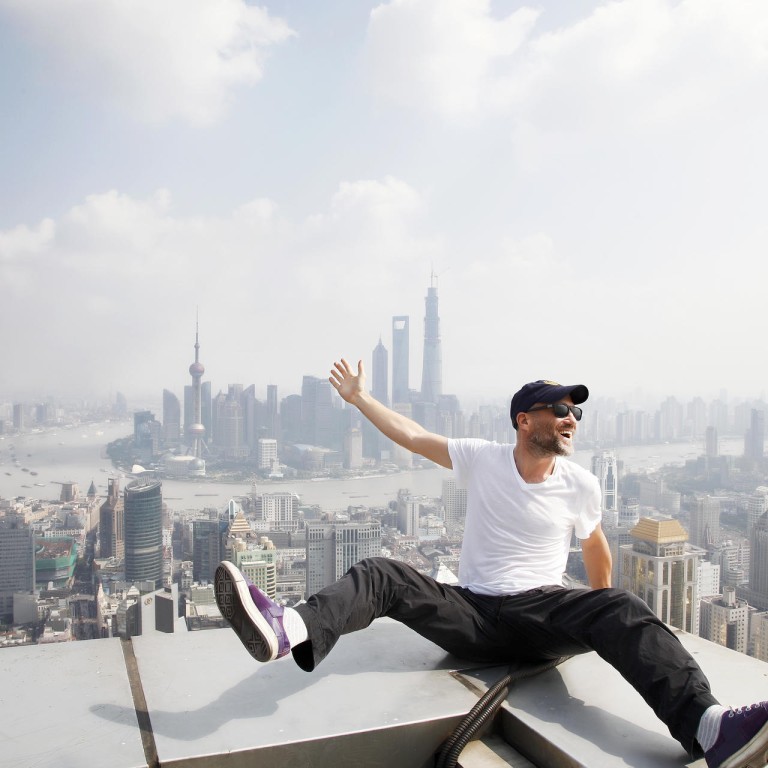
Film world's liaison in China
Noah Weinzweig is the go-to guy for Hollywood blockbusters filming on the mainland
Amid the flood of superhero movies pouring out of Hollywood, Noah Weinzweig, of Beijing-based Teneighty Productions, has often been the big studios' man in China, working on projects such as and .
"My work with Marvel is fantastic," Weinzweig says. "I feel fortunate to work with such an incredible company and the people behind it are just wonderful. Helping the world stay safe by creating more superheroes is a virtuous endeavour. And who wouldn't want to do that?"
The provocative Canadian, who's lived in China for almost 20 years, has watched the mainland develop in unimaginable ways. "How has China not changed since then? It's a completely different country in every way. I think I've witnessed more change here in 20 years than my grandparents experienced in Canada through their 95 years of life," he says.
"In terms of my industry, there were very few filmmakers around in 1995, just the likes of Zhang Yimou and Chen Kaige. There was very little infrastructure, few crews. But now there is an explosion in media and the Chinese box office rivals America's, potentially exceeding it soon."
Securing access has also become a lot easier over the years, allowing his company inside some of the most protected and far-flung areas, from parched Mongolian plains to Shanghai's skyscraper metropolis to industrial plants hidden in the countryside.
The importance of ("relationships") is something Weinzweig knows all too well. "I have a long track record in China, which helps build credibility and contacts, whether government or personal. It's been critical."
Weinzweig, who is fluent in Putonghua, has worked on Hollywood blockbusters such as as well as documentaries traversing the darkest recesses of the industrial landscape.
The critically acclaimed (2011) - directed by Ron Fricke and Mark Magidson - took him deep into the Chinese food-processing industry, on the floor of kill lines in pork and chicken production. "In the West, access is impossible. It's a very protected, ugly industry and nobody wants to show their cruel, dark reality, but in China, I suppose they were still a bit naïve and proud of their industrial accomplishments," he says.
His impressive client list ranges from HBO Films, Apple, Columbia Tristar Pictures and Lucasfilm to National Geographic, Nokia and Sony Pictures. But locally funded productions are still few and far between, Weinzweig says.
The biggest issue in Chinese filmmaking is censorship, he says. "That stymies any real interesting creativity. Until those regulations are relaxed, I don't see the situation getting any better."
But having lived on the mainland for decades, he also understands why the government's policies are in place. China is an incredibly complicated place, he says, and any disruption in the precarious balance of civil stability and civil liberty would be a disaster for the country and the industries inside it.
I have a long track record in China, which helps build credibility and contacts, whether government or personal. It’s been critical
"It's very frustrating," he adds, "but you know a chaotic China would be even more frustrating,"
His fluency in navigating Asia started off in a less than glamorous way, and was more (albeit indirectly) to do with drugs than filmmaking. "I came in the early '90s as a sort of 'missionary'," he says. "A friend of mine, a son of a very wealthy Canadian, had a heroin problem and his father sent me to Thailand to see if he was OK and report back."
He later returned to backpack, "without a heroin addict in tow", and developed an interest in China - and Hong Kong - after reading James Clavell's book, . He sold one of two camera bodies he owned for a boat trip up the Pearl River Delta in 1992 and "it was at that point that I decided that China was the future".
He moved to the Chinese capital in 1995, enrolling in the Beijing Language and Culture University. Soon he began producing for artist-photographer Edward Burtynsky, which has developed into a 14-year friendship and an ambitious partnership. They have shared dingy hotel rooms in industrial townships on the mainland, dived in the waters of the Komodo islands, and worked on documentaries (2013) and (2006).
"My work with Burtynsky has been the most important of my career, it got me on the radar." It was their first project together, accessing some of the largest examples of industry in the world at the Three Gorges Dam, which turned into a book on China, "that ended up being referenced by all the major commercial filmmakers around the world" - and with that, Hollywood came knocking.
Despite working with many of the biggest names in the industry and actors such as Tom Cruise, Chris Hemsworth and the late Philip Seymour Hoffman, Weinzweig's most memorable career experience to date is a characteristically weird Chinese encounter - and involves taking his clothes off with a Shenzhen pig farmer.
"Burtynsky wanted me to find some animal husbandry places, so I ended up cold-calling people and one of the Shenzhen pig farms invited me to come over. I sat down with the manager with Edward's art and in 15 minutes managed to convince him this was worth doing.
"He took me to a room and said, 'Take your clothes off', and he started to take his off. I did the same and we showered together, naked. I then got overalls, safety gloves and a head cap, and we went in to visit the pigs," Weinzweig recalls.
"It was one of the funniest moments. I'll never forget that."

